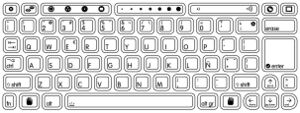OLPC Spanish America: Difference between revisions
(added some areas to work and expand on) |
(→Hardware: added some references to keyboard and electricity) |
||
| Line 19: | Line 19: | ||
===Hardware=== |
===Hardware=== |
||
[[Image:Keyboard argentina.jpg|thumb|right|OLPC Argentina Keyboard]] |
|||
| ⚫ | There are probably three main issues relative to hardware: keyboard, icons and power. Currently the [[OLPC Argentina Keyboard|Argentine keyboard]] should probably not be modified, except for localizing the keys with English wording. Icons on the shell/case are probably going to be 'global', but should not be overlooked for their fitness. Power—though not crucial—could be an issue depending on the bricks tolerance to voltage, |
||
| ⚫ | There are probably three main issues relative to hardware: keyboard, icons and power. Currently the [[OLPC Argentina Keyboard|Argentine keyboard]] should probably not be modified, except for localizing the keys with English wording. Icons on the shell/case are probably going to be 'global', but should not be overlooked for their fitness. Power—though not crucial—could be an issue depending on the bricks tolerance to [http://en.wikipedia.org/wiki/List_of_countries_with_mains_power_plugs%2C_voltages_and_frequencies voltage, frequencies and plugs] (ie: in La Paz, Bolivia, you have both 110 & 220 V usually with the same plug as the US!). This is probably being taken care of, but again, it should not be overlooked. |
||
===Software=== |
===Software=== |
||
Revision as of 17:35, 31 December 2006
It's a bit of a paradox that this page is in English when Spanish is its focus. A reason for this is here.
In the Americas there are three major cultural & linguistic clusters legacy of the colonial period: English, Portuguese and Spanish. Of these three, only the Spanish was fragmented into independent countries; while the English and Portuguese maintained their's: Brazil & USA. Other European nations also colonized the New Continent, but with the exception of France (particularly in Canada) their legacies, although present, are rather small - at least in terms of population.
Not leveraging on this fact fragments the OLPC efforts when dealing in the Americas. Agreements with the UNDP and IADB are important - and give a supra-national structure with which the OLPC can work with - particularly financing and operational levels.
At the content level, this 'theoretically homogeneous' population (~400 million people) is an opportunity that shouldn't be overlooked. Hard science (physics, biology, mathematics, etc.) can be made available (both translated and locally produced) with a relative cost far lower than other localization efforts. Language is another major 'homogeneous' area of development. The concept of 'homogeneity' is always relative, but much in the same way that dubbing into Spanish can be done using 'neutral spanish', content can be developed like-wise.
A major localization 'obstacle' will be History and other social studies. Each country promotes 'their side of the story'—usually in conflict with their neighbor's—and involving a heavily edited version of their own history—usually in detriment of their pre-colonial cultural heritage.
Keeping this in mind would allow the OLPC to have a broad and linguistically homogeneous content base and is the major reason behind this page.
You can see the status by country and the specific section for the Americas. Pages for the (currently) green status countries are: OLPC Argentina and OLPC Uruguay.
Localization into Spanish
Hardware
There are probably three main issues relative to hardware: keyboard, icons and power. Currently the Argentine keyboard should probably not be modified, except for localizing the keys with English wording. Icons on the shell/case are probably going to be 'global', but should not be overlooked for their fitness. Power—though not crucial—could be an issue depending on the bricks tolerance to voltage, frequencies and plugs (ie: in La Paz, Bolivia, you have both 110 & 220 V usually with the same plug as the US!). This is probably being taken care of, but again, it should not be overlooked.
Software
Please help us put the links into the 'global' efforts of localization in this section.
Operating System
As far as I know, Linux localizations for Spanish would probably be adequate enough, although care should be taken to focus on the target audience (kids, not techies) without knowledge either of english or computers. This means extra care in developing and/or tuning manuals, documentation and how-to's.
Active 'global' sections are System Software Software localization
Applications / Activities
This area will be somewhat redundant to OLPC software task list, Software localization, Basic OLPC Software Set
Teachers should not be forgotten! They´ll be a major player—either as promoters or detractors—and their needs should be properly addressed, not just in the obvious sense of capacity building and training, but also in the domain of tools that they lack (ie: taking attendance, keeping grades, etc.)
Content in Spanish
Development of local content should probably start by analyzing and doing an inventory of what is available in each country taking into consideration the source (official vs. grassroot/private), their media (printed vs digital) and the possibility of actual distribution (both in scale and license) together with the OLPC.
Besides the 'local' efforts, note should be taken of 'global' efforts in spanish (ie: Wikipedia / OEPC) and similar.
Why in English?
My reason (Xavi) is simple: the OLPC organization's language is English. That said, we should be able to interact and coordinate with them and later take those ideas into the specific country pages. BTW, this is an open question, not an answer.
